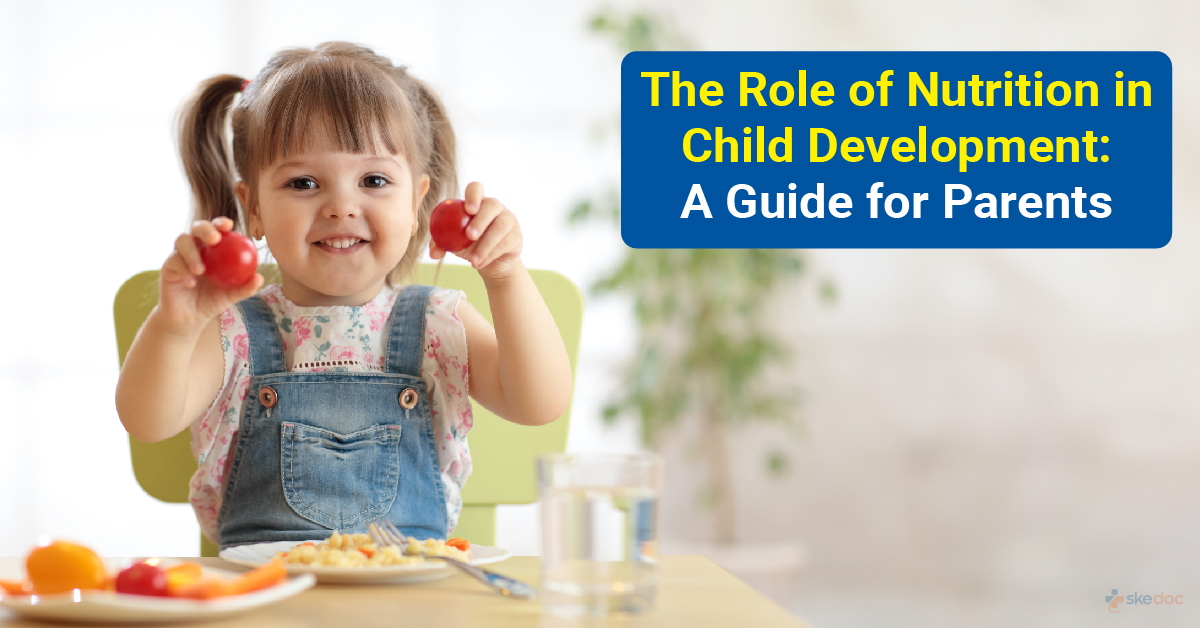Allergy
Blood Diseases
Bone & Joints
Brain
Cancer
Child Care
Cosmetic Surgery
Diabetes
Endocrinology
ENT
Eye
Gen Medicine
General Surgery
Heart
Kidney
Lifestyle
Liver & Digestive
Lung
Men’s Health
Mental health
Physiotherapy
Rheumatology
Skin and hair
Sleep Disorders
Spine
Transplant
Women Health
Thyroid
Vascular Surgery
The Importance of Nutrition in Child Development

Malnutrition can occur when a child receives too few or too many nutrients, leading to various health problems. It refers to a deficiency, excess, or imbalance of energy, protein, and other nutrients that adversely affect the body's tissues and form.
Malnutrition is a growing concern among children under the age of five, especially those who live in poverty or lack access to adequate nutrition. Optimal nutrition is crucial for a child's development, and either excess or deficiency can be harmful. Undernutrition can cause stunted growth, wasting, and underweight, while excess nutrition can lead to obesity, which is a major health burden in developed countries.
What Nutrients Are Essential For Child Development?
Proper nutrition for infants is crucial for their growth, development, and resistance to infections and diseases. The decision to breastfeed or bottle-feed should be made by the expectant mother before birth, and adequate preparation should be made for the chosen method.
Exclusive breastfeeding for the first 6 months of the baby's life provides all the essential nutrients required for growth and development, including lactoferrin which protects the baby from infections, proteins, and carbohydrates. The most abundant proteins found in breast milk are whey, α-lactalbumin, lactoferrin, secretory immunoglobulin IgA, lysozyme, and serum albumin.
Human milk fat has high concentrations of palmitic and oleic acids, with the former heavily concentrated in the 2-position and the latter in the 1- and 3-positions of the triglycerides. These promote brain development in infants.
Birth to Six Months: From birth up to six months of age, the World Health Organization (WHO) and the Pan American Health Organization recommend that infants should be fed exclusively with breast milk. However, if the mother's diet does not have enough vitamins D and B12, the baby may require supplements to prevent rickets.
Using Formula: For babies who are being fed with infant formula, it is essential that the formula is enriched with iron.
How Many Times Should Baby Be Fed In a Day?
As for the number of times a baby should be fed in a day, it is advisable to feed the baby as often as they want. Typically, a baby may cry when they feel hungry, and this is an indication that they need to be fed.
How Can i Ensure My Child Is Getting a Balanced Diet?
To ensure your child is getting a balanced diet, it is recommended to exclusively breastfeed them (without even giving them water) during the first 6 months. Breast milk provides all the essential nutrients needed for the physical and brain development of your child. However, breast milk is deficient in Vitamin-K and Vitamin-D, so it's important to supplement your infant with these vitamins to ensure proper development.
Breast milk has numerous health benefits, such as preventing anaemia, obesity, sudden infant death syndrome, promoting health and protecting the child from infections, promoting brain development, digestive health, intelligence, and oral health.
What Are The Long-Term Effects Of Poor Nutrition In Children?
The long-term effects of poor nutrition in children can be severe. Risk factors for malnutrition include poverty, parental illiteracy, inadequate feeding practices, and large family size. Therefore, it is crucial to breastfeed your child until the age of two years, and exclusively until the age of 6 months to prevent malnutrition.
Are There Any Specific Foods That Promote Brain Development In Children?
Incorporating the following foods into a child's diet after the weaning period, which usually occurs after 6 months of exclusive breastfeeding, can support healthy brain development and function.
- Eggs: Eggs are an excellent source of vitamins and proteins that are essential for growth and development. They also contain choline, a nutrient that is important for brain health.
- Oily Fish: Oily fish, such as salmon, mackerel, and sardines, are rich in omega-3 fatty acids that aid in brain development. Omega-3 fatty acids are important for building and maintaining brain cells, and they may also help prevent cognitive decline later in life.
- Leafy Greens: Leafy greens, such as spinach and kale, are a great source of folate that supports brain development and function. Folate is a B vitamin that helps produce and maintain healthy brain cells.
- Yogurt: Yogurt provides a unique microbiome for gut health, which is important for overall health and immunity. Some studies suggest that probiotics, the beneficial bacteria found in yogurt and other fermented foods, may also have a positive effect on brain function.
- Oats: Oats are low glycemic index foods that have been found to be beneficial for cognitive function in 12-14 year-olds during the school morning. They provide slow-release energy that can help sustain mental alertness and concentration.
- Beans and Lentils: Beans and lentils are rich in zinc, which plays a role in brain development and function. Zinc is also important for maintaining a healthy immune system and wound healing.
How Can i Encourage Healthy Eating Habits In My Child?
The following strategies can help:
- Have regular family meals: Family meals are a comforting ritual for both parents and kids. Children like the predictability of family meals, and parents get a chance to catch up with their kids. Kids who take part in regular family meals are also more likely to eat fruits, vegetables, and grains, less likely to snack on unhealthy foods, and less likely to smoke, use marijuana, or drink alcohol. Family meals are also an opportunity for parents to introduce their kids to new foods and to be role models for healthy eating.
- Serve a variety of healthy foods and snacks: Children mostly eat what is available at home when they feel hungry. Stocking up with healthy foods such as fresh vegetables and homemade snacks will encourage children to eat and stay healthy. Instead of filling your fridge with ice cream, cookies, and soft drinks, stock it with fresh vegetables, nuts, and homemade healthy snacks. Limit fat intake and avoid high-sugar drinks.
- Be a role model by eating healthily yourself: Children tend to follow the example of adults they see every day. The best way to encourage healthy eating habits is by eating healthy yourself and setting a good example for your children.
- Avoid battles over food: Children should be allowed to decide if they are hungry, what they will eat from the foods served, and when they are full. Parents should control which foods are available to their children, both at mealtime and between meals. By not bribing children with dessert to eat their meal, parents can encourage their children to make their own decisions.
- Involve children in the process: Children enjoy being given a choice of what to make for dinner. Talking to them about making choices and planning a balanced meal can help them develop healthy eating habits.
- Keep your child hydrated: Children play hard or participate in different sports, which can deplete water levels in their bodies. Parents should encourage their children to drink an optimal amount of water by letting them buy fun and cute water bottles, which can keep children hydrated.
Nutrition plays a crucial role in child development, brain health, and improving immunity. Knowing about the nutritional requirements and deleterious effects of certain foods on children will help parents make the right decisions to promote their children's health.
Was this article helpful?
YesNo




